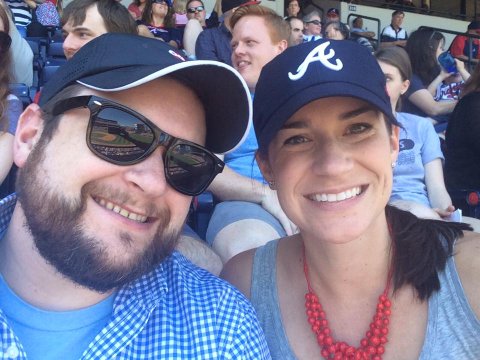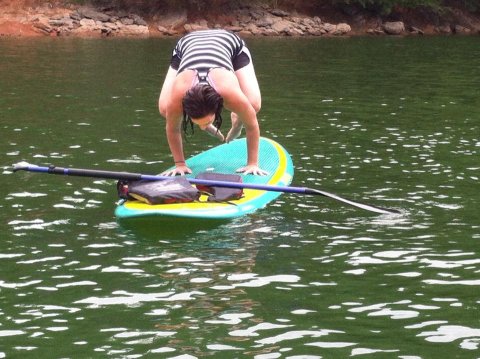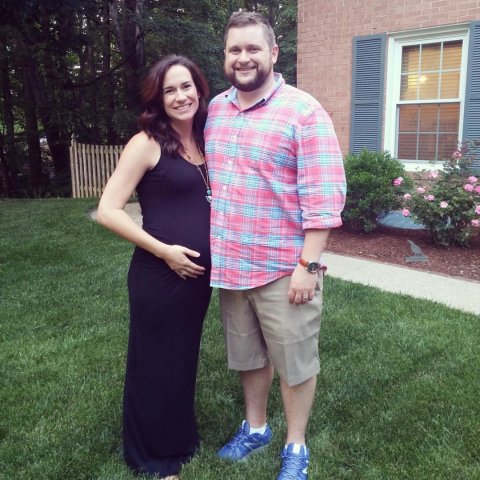Meagan Fitzpatrick, biosafety officer in Environmental Health and Safety, initially set out to be a full-time researcher.
For someone who initially set out to be a full-time researcher, overseeing biosafety for a large research enterprise is a natural fit.
Meagan Fitzpatrick, biosafety officer in Environmental Health and Safety, studied biology and chemistry as an undergraduate at Loyola University. Once she started doing research, though, she realized the lab was not where she wanted to be.
“I like working with people and wasn’t getting to do that,” she said. Now, she’s able to support academic research in a different way. “I still get to read science and talk about it a lot, but on a broader, macro level.”
The Biosafety Office within Georgia Tech’s Environmental Health and Safety (EHS) unit oversees training, resources, and protocols for biohazards for research labs across campus. Their job is to ensure the safety of both those in the labs and those on the rest of the campus.
“We’re not just here to dictate rules, but to coach,” she said. “We strive to develop a partnership with the researcher community. We see them as our clients.”
When dealing with biosafety, no two days are alike. One challenge on the job can be trying to plan long-term when you never know what the day will bring.
“We’ve had incidents where researchers will have an exposure to a biological material due to a percutaneous injury involving a sharp object, like a needle, piece of broken glass, or a razor blade,” Fitzpatrick said. “We teach them to wash the exposed area for 15 minutes with soap and warm water at the sink and then to call the Georgia Tech Police Department, who dispatch to the EHS emergency phone so we can assist with next steps. After the incident, we work to ensure that the individual receives any required medical care.”
After an incident, EHS debriefs with those involved in an incident to determine the cause and what can be done to prevent a similar incident and improve future response.
“This is key because, truly, there are no accidents,” she said. “All exposures and injuries can be prevented and that’s what we seek to do.”
Fitzpatrick held a similar position at Emory University for six years before coming to Tech in 2014. While there, she received a Master of Public Health in Environmental Health from the university’s Rollins School. Her master’s capstone project on standard operating procedure and risk assessment for a patient isolation unit used to transport highly infectious patients within the Department of Defense to Emory University allowed her to work with Emory’s physicians as they prepared to receive and treat patients with infected with highly infectious diseases, like those infected with Ebola in 2014. Fitzpatrick also trained doctors at Stamps Health Services on Ebola protocols when she came to Tech.
In addition, her master’s work focused on sustainability, which has served as a primer for some of her work at Tech. She is part of a sustainability committee with Facilities Management and chairs a subcommittee on program development. Their current project is a workplace sustainability pilot which was developed in through a partnership with the Office of Campus Sustainability.
“We provide a sort of checklist of things for offices to work toward to get certified as
a green office,” she said. The checklist is focused on behavioral changes and includes sections like on waste reduction, energy efficiency, and a safe and healthy office environment. The pilot is currently underway in the Facilities and the Office of Undergraduate Education.
Beyond campus, Fitzpatrick is involved in the larger biosafety community through the Campus Safety Health and Environmental Management Association, as a member of its board of trustees. She’s also a member of the American Biological Safety Association.
“You learn a lot from working on different things and with people you don’t normally interact with,” she said. “Sometimes a new problem can feel like this huge elephant, but there’s probably someone out there who has already dealt with it and can help you work through it.”
Originally from Maryland, Fitzpatrick and her husband have made a home in Atlanta over the past eight years. They’ll soon be growing their family, as their first child is due in September.
“It’s been the two of us for so long, and it’s exciting to add someone new — besides our dog — and for the priority shift that will happen,” she said.
As a varsity swimmer at Loyola for four years, following years of childhood swimming, being active and outdoors has always been part of Fitzpatrick’s life. Family vacations often included outdoor activities, which still play a leading role for her and her husband. They often spend weekends hiking or walking in Atlanta’s parks, and Fitzpatrick is an active yogi. Her preferred practice is power vinyasa, a fast-paced and challenging version of yoga. She’s even combined her indoor and outdoor interests and tried standup paddleboard yoga.
At six months pregnant, though, the power vinyasa is now taking a backseat to prenatal practice.
“It’s definitely a slower pace,” she said. “There’s more lying down.”
Both in work and her hobbies, Fitzpatrick is eager to get involved and take on new challenges. Thankfully, she’s found Tech to be just the right place for that.
“It’s such a warm and welcoming place,” she said. “If you show an interest in trying something or working on something, there are going to be opportunities for you.”
Additional Images




